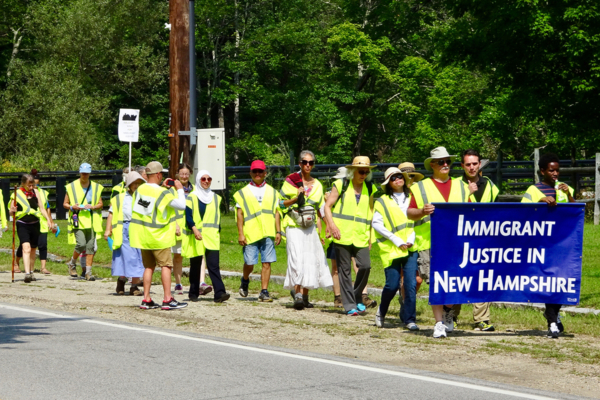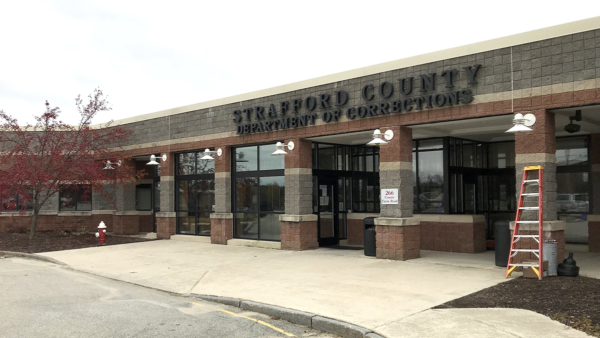New Hampshire churches’ immigrant ‘Solidarity Walk’ expands to include segments in 4 statesPosted Aug 19, 2019 |
|

Participants in the 2018 Solidarity Walk for Immigrant Justice make their way across New Hampshire – from Manchester to Dover – tracing the path immigrants take when they are detained by federal authorities and held in the Strafford County jail. Photo: David Price
[Episcopal News Service] A faith-based march to a jail that holds immigrant detainees in Dover, New Hampshire, has grown in its second year to include walkers – and cyclists – from four states who are calling on government agencies to treat the immigrants in their communities with dignity and compassion.
The Solidarity Walk for Immigrant Justice, scheduled for this week, will culminate Aug. 24 in a prayer vigil outside the Strafford County Department of Corrections, one of the few facilities in New England with a federal contract to hold immigrant detainees. As with the inaugural Solidarity Walk in August 2018, participants this year will trek some or all of the distance to the jail by choosing one or more daylong segments.
About 100 people participated in last year’s prayer vigil at the jail. “It was a great start,” said the Rev. Jason Wells, an Episcopal priest and executive director of the New Hampshire Council of Churches, which coordinates the Solidarity Walk. “It caught a lot of people’s imaginations. It got them inspired.”
He estimated that participation will at least double this year, now that interfaith advocacy groups in Maine, Massachusetts and Vermont are organizing their own segments. The four groups will converge by midday Aug. 24 for lunch in Madbury, New Hampshire, before continuing to the jail.
The group from Massachusetts already is on its way. The Essex County Community Organization is coordinating the Massachusetts segments, stretched over six days so walkers can cover the 76 miles in time for the vigil in Dover. It embarked Aug. 19 after a kickoff rally outside the federal building in Boston.
Another group is being organized by Vermont Interfaith Action. It leaves the Unitarian Church of Montpelier on Aug. 21 and has more ground to cover than any of the other groups, so participants will head out on bicycles instead of on foot. Estimated distance: 160 miles over four days.
The shortest walk is the one organized by Maine’s Kittery Advocates for All. It starts early Aug. 24 in South Berwick, just across the Salmon Falls River from New Hampshire, and it will cover the 15 miles to Dover in about five hours of walking.
Participants from New Hampshire will walk up to 36 miles over four days, starting Aug. 21 at the federal courthouse in Concord.
One of the goals of the inaugural Solidarity Walk for Immigrant Justice was to draw attention to immigration issues in New England at a time when much of the focus politically had been on the United States’ southern border. This year, tensions remain high in southern states, with the Trump administration tightening its regulation of border crossings while facing criticism for its treatment of immigrant families being held in detention.
Wells noted that while large-scale immigration enforcement raids in Mississippi drew national headlines this month, smaller raids have extended north to New Hampshire. More than two dozen people lacking immigration documentation were taken into custody in the past month in the Lebanon and Littleton areas of the state.
The New Hampshire Council of Churches, which includes the Episcopal Diocese of New Hampshire, has been active on a number of immigration fronts, Wells said, including pressing the state’s federal lawmakers to decrease “federal funding for the deportation machine.” And with New Hampshire set to hold the nation’s first presidential primary in February, people of faith are asking candidates on the campaign trail how they would stop what they see as harmful enforcement policies.
Member churches are particularly alarmed by separation of families during deportation proceedings, and Wells said that threat has been amplified by the Trump administration’s decision to end the Deferred Action for Childhood Arrivals, an Obama-era policy also known as DACA that protected about 800,000 immigrants who were brought to the United States illegally as children.
DACA recipients are now being used as bargaining chips in legislative negotiations, Wells said, which “treats real human lives without the dignity that we would extend to everyone else.”

The Strafford County jail in Dover, New Hampshire, is one of more than 200 prisons and jails that hold federal immigration detainees and the one such facility in the state. Photo: David Paulsen/Episcopal News Service
Such topics are expected to be part of the conversation during evening gatherings this week at the end of each segment of the Solidarity Walk. Participants will close each day at host churches, which will offer potluck suppers and a place for multi-day walkers to stay overnight.
On the final day, members of the public are invited to join the four-state group of walkers and cyclists at 4 p.m. for the prayer vigil at the Strafford County jail. A leader from the advocacy group Faith in Action is expected to lead a litany of lament for individuals and families harmed through immigration enforcement actions.
– David Paulsen is an editor and reporter for Episcopal News Service. He can be reached at dpaulsen@episcopalchurch.org.

Social Menu